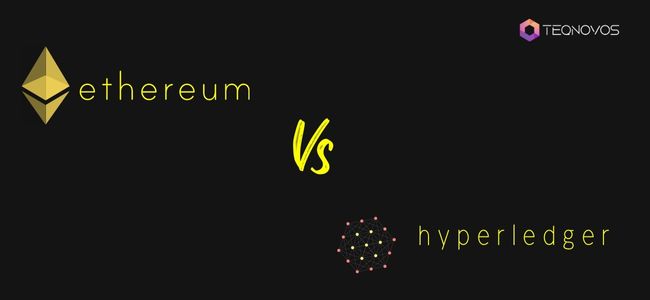Hyperledger vs Ethereum: Which One is Better For Your Business?
Ethereum is currently the go-to choice for creating dApps, while Hyperledger’s popularity among businesses is on the rise. But which blockchain platform would benefit your business the most? Let’s find out in this blog!
Blockchain technology, since its inception, has been successful in gaining the attention of the masses. Firstly, it was Bitcoin that shook the whole world by introducing blockchain technology in 2009. Then, other cryptocurrencies emerged, such as Litecoin, Namecoin, Dogecoin, Ripple, and Ethereum.
In recent years, several other applications of blockchain have become popular, including Web 3.0, Defi, and dApps. Today, many businesses are focusing on leveraging blockchain to strengthen their operations and gain a competitive edge.
Most businesses are particularly interested in building dApps or decentralized applications. While searching for the best blockchain platforms to build dApps, your search may narrow down to the two most popular options, namely Ethereum and Hyperledger.
Here, we are going to discuss Hyperledger vs Ethereum to help you figure out the key differences between the two platforms. Eventually, it will become easier for you to choose one that best suits your business requirements.
So, let’s get started!
What is Hyperledger?
Hyperledger is a global project that combines several open-source blockchains and tools for creating enterprise-grade blockchain solutions. The project is an initiative by the Linux Foundation to accelerate the development and adoption of blockchain technology. Also, there are several big tech companies contributing to Hyperledger, including IBM and Intel.
What is Ethereum?
Ethereum is also an open-source blockchain platform, which comes with smart contract functionality. A smart contract acts as an agreement between two parties, and it is basically a program that executes when a certain condition is met.
It is the smart contract functionality that makes it possible to create and deploy dApps on the Ethereum network. Also, anyone can use the Ethereum platform to deploy dApps and access other dApps.
Difference Between Hyperledger and Ethereum
Hyperledger and Ethereum are different in many ways, and it’s essential for you to know all the key differences between them to choose the right one for your business. Here we are going to discuss how Hyperledger and Ethereum differ on the basis of several parameters.
-
Hyperledger vs Ethereum: Type of Blockchain
The distributed ledgers or blockchains available under Hyperledger are permissioned. It means that no one can access the network without appropriate permissions. As a result, only authorized users can view the transactional data in a Hyperledger network. Due to the permissioned nature of Hyperledger, it is utterly suitable for storing and sharing confidential data.
Ethereum is a permissionless or public blockchain. Anyone can join the Ethereum network and view transactions. It is not possible to utilize the Ethereum blockchain for storing confidential data.
-
Hyperledger vs Ethereum: Consensus Mechanism
Hyperledger does not make use of any consensus mechanism to validate transactions. Due to the absence of a consensus mechanism, a transaction is processed instantly if the participating parties mutually agree on the transaction.
Ethereum makes use of the Proof-of-Work (PoW) mechanism to validate transactions. To process and record a transaction, the participating nodes of the Ethereum network should validate it.
-
Hyperledger vs Ethereum: Purpose
The primary objective of Hyperledger is to process business-to-business (B2B) transactions. Also, the dApps created on Hyperledger cater to a limited number of users.
Ethereum is ideal for processing business-to-consumer transactions. Also, dApps built over the Ethereum blockchain are readily available for mass usage.
-
Hyperledger vs Ethereum: Transaction Speed
As stated earlier, Hyperledger does not employ any consensus mechanism to validate transactions, and only the participating parties validate a transaction. The time needed to validate and record transactions is low, and thus Hyperledger is capable of processing a large number of transactions in a given time (2000 transactions per second).
When it comes to Ethereum, the validation process is long due to the proof-of-work consensus mechanism. A transaction needs to be validated by the nodes before they get recorded on the network. As the whole process of validating and recording transactions is complex and time-taking, the transaction speed of Ethereum is quite low (20 transactions per second).
-
Hyperledger vs Ethereum: Cryptocurrency
Hyperledger does not have any native cryptocurrency or token as there is no concept of mining. In general, mining is the process in which the nodes within the network participate in the process of validating transactions and get rewarded with a certain amount of cryptocurrency.
Ethereum has in-built support for cryptocurrencies and it has its own native token that goes by the same name, Ethereum (ETH). Nodes in the Ethereum network get rewarded with ETH for validating transactions. If a business needs to create an application that requires the use of tokens, Ethereum becomes a viable option.
-
Hyperledger vs Ethereum: Programming Language
Instead of smart contracts, hyper ledger makes use of chaincode to create digital contracts. In general, Go is the primary programming language for writing chaincode. However, other programming languages such as Java, JavaScript, and Python can be used sometimes for programming chaincode.
Developers make use of Solidity programming language for creating smart contracts in Ethereum. But for application development, a wide array of programming languages are available, including JavaScript, Python, and Go.
-
Hyperledger vs Ethereum: Peer Participation
Hyperledger does not need the active involvement of every peer in the network to process transactions. Only the participants need to agree mutually to process the transaction.
When it comes to Ethereum, each peer or node in the network is responsible for validating transactions. However, the active participation of several peers restricts the ability of the dApps built on Ethereum to scale and work efficiently.
Which One to Choose for Your Business?
Both Hyperledger and Ethereum are popular platforms for building dApps. However, they have different use cases and it is not possible to replace one platform with the other.
Hyperledger makes use of a permissioned network, which makes it an ideal choice for developing private applications that only a certain number of users can access. On the other hand, Ethereum is a public blockchain that supports the creation of dApps that anyone can access and use.
If you want to build B2B apps that need to control user access strictly and ensure data confidentiality, Hyperledger becomes an ideal choice. Whereas, Ethereum makes more sense when your aim is to develop B2C applications that ensure complete transparency.
Conclusion
We have outlined all the key differences between Hyperledger and Ethereum above to help you choose one that best suits your business requirements. Also, it is quite evident that the features and characteristics of Hyperledger and Ethereum are different, and thus they cannot simply replace each other.
If you are still unsure which one between Hyperledger and Ethereum is the better choice for your project, you can consider having a consultation with the best blockchain development company. They will first identify and understand all the key requirements of your project and provide you with the best advice.
FAQs
1. What is the difference between blockchain and Hyperledger?
Blockchain is a technology that facilitates data storage in a decentralized manner. Hyperledger, on the other hand, is a project that brings together various open-source tools and blockchain platforms that are suitable for developing enterprise-grade blockchain solutions.
2. Is Hyperledger a cryptocurrency?
No, Hyperledger is neither a cryptocurrency nor does it support cryptocurrencies. It brings together various distributed ledgers, tools, and libraries for the development of blockchain-based solutions.
3. Does Ethereum use Hyperledger?
Ethereum and Hyperledger are two separate entities. While Ethereum is an open-source public blockchain that supports smart contracts, Hyperledger is a project that comprises various tools, libraries, and standards for creating permissioned blockchains and other solutions.
















